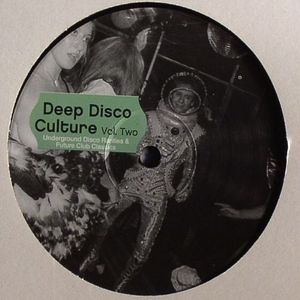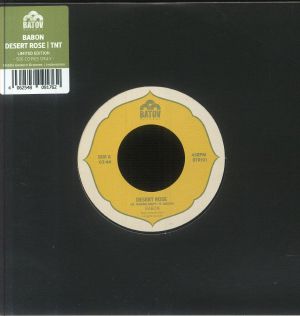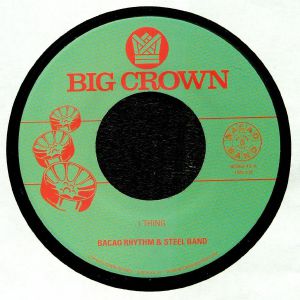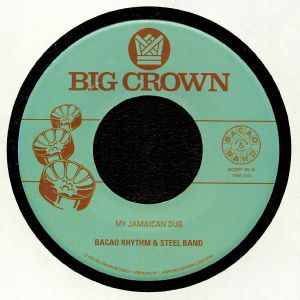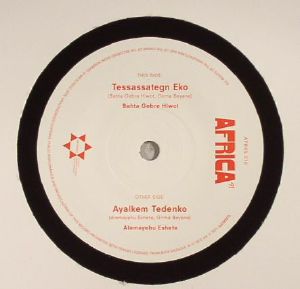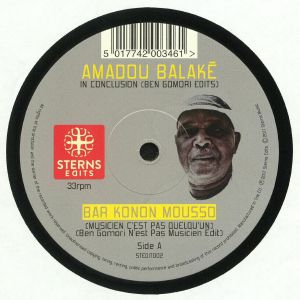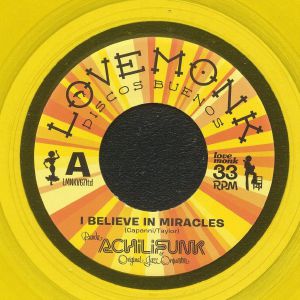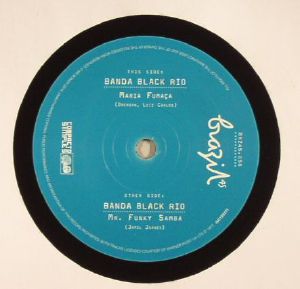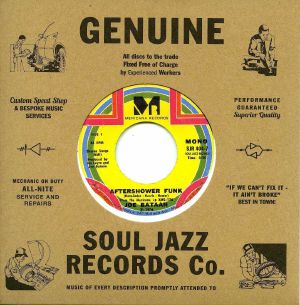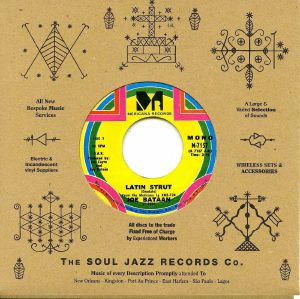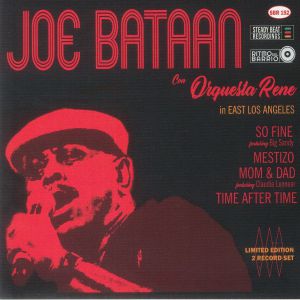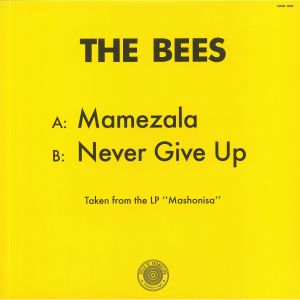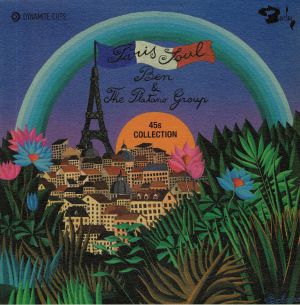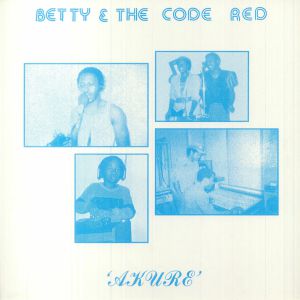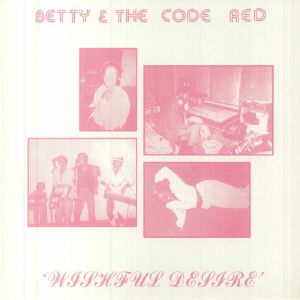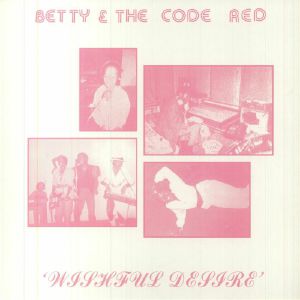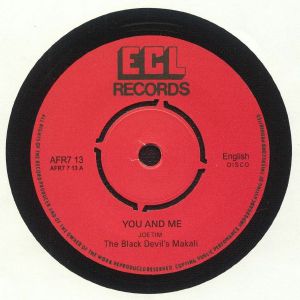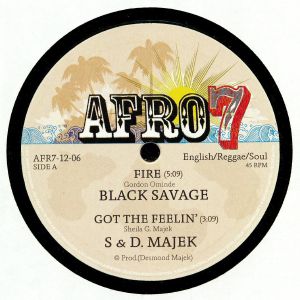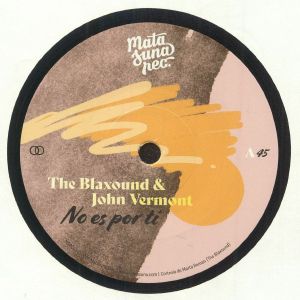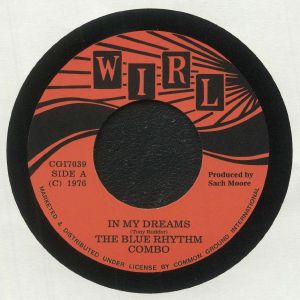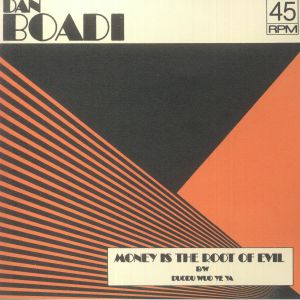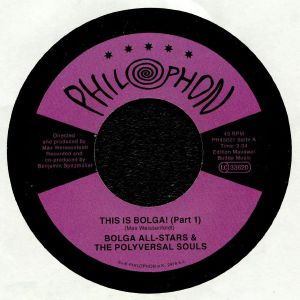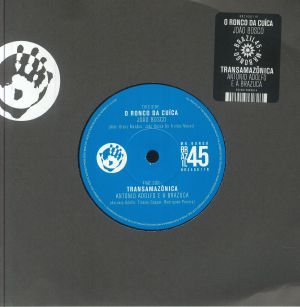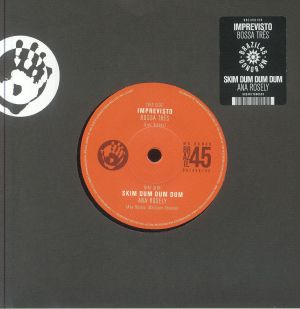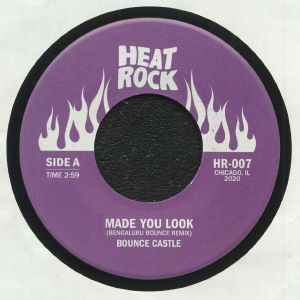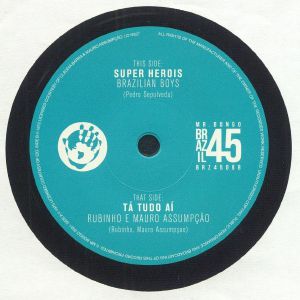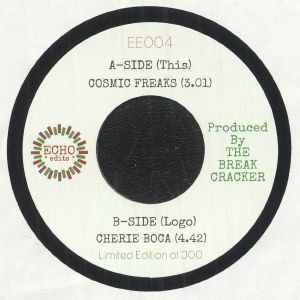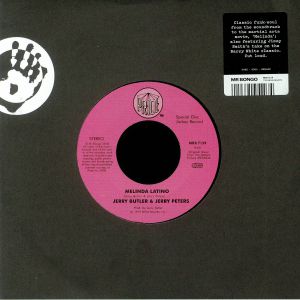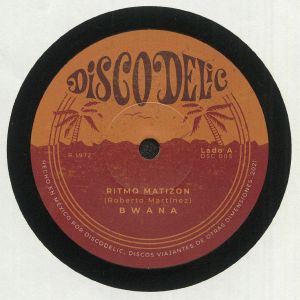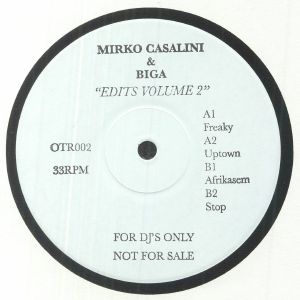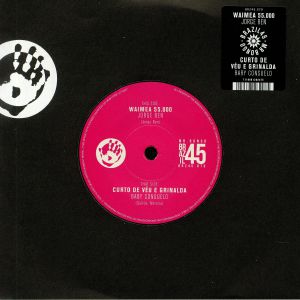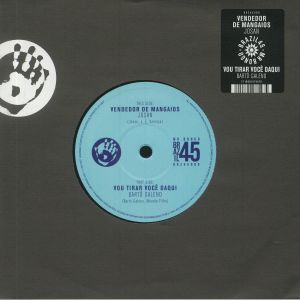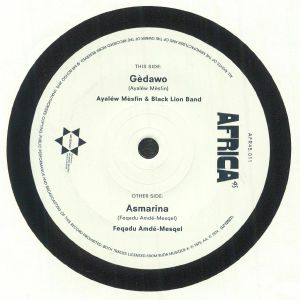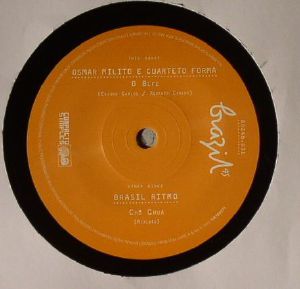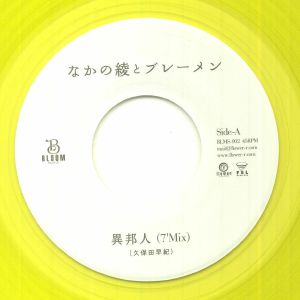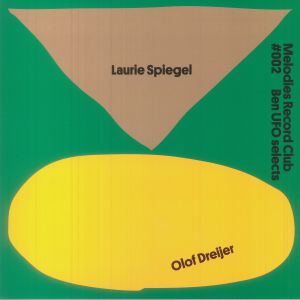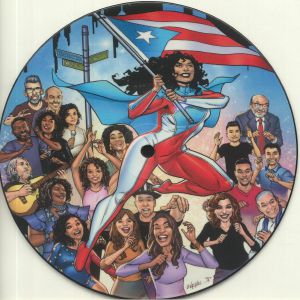Filter
Stock
Type
Artist
Label
Featured
Release Title
Price
Tags
Back catalogue: International
Juno's full catalogue of International
Singles
Cat: SUSSD 12002. Rel: 31 Oct 07
in stock $8.60
Review: Indonesia-based Babon was founded in 2023 by longtime friends Wahyudi T. Raupp and Rayi Raditia and craft instrumentals addressing environmental issues. Their sound fuses Melbourne's vibrant music energy with dangdut rhythms, gamelan percussion, and melodic keroncong folk styles. Here they debut on Batov Records with the wonderful 'Tropical Desert Music' which blends Indonesian traditions with Afro-Latin funk, Morricone-inspired grooves, Bollywood breaks and blues. It's the sort of sound that is perfect for fans of Khruangbin or Sababa 5. The A-side 'Desert Rose' is a spaghetti blues anthem, while the flip 'TNT' tells a miner's tragic tale through cinematic, explosive instrumentation.
… Read more in stock $15.26
Review: Bjorn Wagner's Bacao Rhythm & Steel Band combo recently returned from a two-year hiatus with a killer new album, "The Serpent's Mouth". It's that set - a glorious fusion of funk, soul, disco, jazz and Trinidadian steel band music - from which these two top tracks are taken from. A-side "1 Thing" is particularly glorious. As one quick listen to the clips will confirm, it's a riotous instrumental cover of the Amerie R&B classic of the same name, which replaces the singer's vocals with ear-catching steel drums. The same killer combination of flash-friend funk guitars, bustling drums and tropical steel drum sounds can also be heard on B-side "Hoopla Hoop", which also boasts some suitably fuzzy horns.
… Read moreGespielt von: Mukatsuku Records Chart, The Allergies, RUSTAM OSPANOFF., Craig Charles Funk And Soul, Mako & Mr Bristow, Voodoocuts, Juno Recommends Funk, Afro Beat Foundation, Osmose, I Love 45's!, Skyline Recordings Chart, Calamity Jade (Willwork4funk), Originals, Rebel Soul, SPASIBO RECORDS, Dynamite Cuts
… Read more in stock $10.54
Review: The always excellently go slow and tropical sounds of Big Crown now look to Bacao Rhythm and Steel Band for covers of two classics. Up first is Grace Jones' nightclub classic "My Jamaican Guy" while on the flip is Erykah Badu's tribute to the legendary J Dilla, "The Healer". Both retain the essence of the original but come with loose hand claps, shimmering steel drums that bring coastal breezes, sand and sun into the equation and leave you laying horizontal. These are fine interpretations of top notch source material.
… Read more in stock $9.71
Tessassategn Eko (limited 7")
Cat: AFR 45016. Rel: 14 Jun 16
Review: Afro 45's / Mr Bongo show no signs of stopping their tireless run of form and, 7" after 7", they just keep on producing the goods. There's yet more '70s goodness with this new little scorcher: the A-side is 1973's "Tessassategn Eko" by Bahta Gebre Hiwot, a pensive Ethiopian pop hit for all sorts of music fans to enjoy, but "Ayalqem Tedqem" by Alemayehu Eshete on the B-side is where it's at... just listen to that bass and you'll instantly recognize this wonderful little cover.
… Read more in stock $12.49
Review: Cheb Bakr's latest release reflects the rich interplay of North African tradition and modernity. Rooted in rhythmic Arabic melodies, the tracks blend warm, soulful instrumentation with a contemporary edge. The production draws from Libyan pop's energetic pulse, merging traditional sounds with subtle nods to r&b and hip-hop. This is a striking example of how regional influences can be reinterpreted for new audiences while retaining their cultural depth and vibrancy.
… Read more in stock $13.87
Review: This release is a story of serendipitous stars aligning. Having released Bala Desejo's anthemic single, 'Baile De Mascaras', back in May 2023, Mr. Bongo could sense that they had a summer classic on their hands. The label always thought that it had the potential to find fans in a dance music audience; and in a further twist of fate, the sensational DJ, producer, and radio presenter Jamz Supernova recently graced their Great Escape in-store event with a phenomenal DJ set. After some feverish digging and emailing to her team, Bongo discovered that she was a fan of the original song and had made a personal edit to play in her DJ sets. Gilles had heard Jamz spinning the edit and asked for a copy, and by sheer coincidence and good fortune, it all fell into place. The track is a beast of an edit that gets heavier and deeper as it progresses.
… Read more in stock $17.48
Review: This officially licensed 12" sees prolific British disco producer Ben Gomori take a scalpel to two cuts from veteran African musician Amadou Balake's 2015 album, In Conclusion. On side A you'll find a fantastic, eight-minute extension of the breezy shuffler "Bar Konon Mousso (Musicien C'est Pas Quelqu'un)", where snaking saxophone solos and sun-kissed, juju style guitars rise above a hot-stepping, bass-heavy groove. Turn to the flipside for a thrillingly epic take on "Massa Kamba", a deeper and slightly more musically intricate cut blessed with a blissful; Pat Metheny style jazz guitar breakdown, memorable chorus vocals and evocative horn lines.
… Read more in stock $14.15
I Believe In Miracles (limited translucent yellow vinyl 7")
Cat: LMNKVLD 67. Rel: 04 Jul 24
Review: In 2011, Banda Achilifunk & OJO served up Gitano Real, one of the year's most essential albums. It was caned far and wide by funk lovers, in particular Craig Charles on his 6 Music show. Now, two cover versions taken from the essential album have been pressed to limited edition translucent yellow vinyl. First up, 'I Believe in Miracles' is an overwhelming take on the Jackson Sisters classic with plenty of happy Latin vibes and rumba funk rhythms. Flip it over for a more abstract version of McFadden and Whitehead's seminal 'Ain't No Stoping Us Now' which is a soulful disco number packed with sunshine.
… Read moreGespielt von: Voodoocuts, Juno Recommends Funky House, Juno Recommends Funk, Galletas Calientes, Marc Hype, I Love 45's!
in stock $11.93
Review: For the latest release on their on-point Brasil 45s sub-label, Mr Bongo takes a trip back to 1977, and the early days of legendary fusion outfit Banda Black Rio. Both the cuts here are taken from the band's brilliant debut album, Maria Fumaca, and see them fusing Brasilian samba and jazz sounds with the righteous, dancefloor-friendly grooves of funk and disco. "Maria Fumaca" itself is a deliciously sunny and sweaty affair, with punchy horns, eyes-closed guitar solos and jazz-funk electic piano lines rising above a carnival-ready samba-funk groove. The U.S funk influence comes to the fore more on flipside "Mr Funky Samba", which sounds like Azymuth jamming with members of the T.K Disco, Philadelphia International and Salsoul house bands. Yep, it's that good.
… Read more in stock $12.49
Review: An intriguing song is 'Aftershower Funk', the Latin American musician Joe Bataan's curt salsa single from 1974. Fresh, cologned, groomed, and with towel firmly wrapped round hair, Bataan's largely instrumental track is about as lightfooted as the sprightly young man he was, then at 34 years old. With heavy tin drum and cowbell clangings peppered throughout, a toe-tapping mood is sure to beset the listener. B-sider 'Fin' continues the mood, uniting percussion with piano, brass, whistle and rhythm guitar; a much fuller exercise in triumphant finality.
… Read more in stock $13.59
Review: The riffing 'Latin Strut' by Joe Bataan, colloquially known as the "King of Latin Soul", was first released in 1974. This was an early joint outing between specialist Latin music pushers Mericana Records and RCA Victor; having already earned his name as a releaser of many a gold-rimmed, inner-labelled 7" record, Bataan was well into his acetates and LPs game by the point of his comeup in Spanish Harlem, New York. Backed as it was in '74 by 'Peace, Friendship & Solidarity', a waltzing song dedicated to the plight of Berliners during the Cold War, the star funk-samba shuffle 'Latin Strut' contrasts as a sizzling solicitation of descending contrapuntal piano and Quena fluting pizzazz.
… Read more! low stock $12.49
Review: This 2024 edition marks the return of Joe Bataan, via the same track that made his name in 2004. Vampi Soul first welcomed the Latin Soul king to the label two decades back, facilitating the release of his 2005 album Call My Name. The pre-release singles for the album were 'Chick-A-Boom' and 'Cycles Of You', packed onto a single 7"; these quickly became DJs' favourites and have thus since remained long out of print. As it was twenty years ago, 'Chick-A-Boom' is a simultaneously upbeat but ghostly track, with Bataan's vocals quadrupling up in a wall of sound while providing the vibe equivalent of a Jackie Chan flick. 'Call My Name', meanwhile, goes heavy on the clavichord and synth whistle, as Bataan revels in a funereal theme, dancing, thundersticking into the great beyond.
… Read moreGespielt von: Juno Recommends Funk
in stock $9.75
Joe Bataan In East LA (double 7")
Cat: SBR 152. Rel: 12 Jun 23
Review: ,Joe Bataan has been busy in East L.A. with Orquesta Rene for this new Latin jazz double 7" courtesy of Steady Beat. It features four all new pieces drenched in soul and percussion, starting with 'So Fine' (feat Big Sandy), a mid tempo groove with vocal longing and languid horns. 'Mestizo' is a more steamy and intimate piece with sung-spoken lyrics and glowing, golden chords. 'Mom & Dad' (feat Claudia Lennear) has s steamy shuffle to its rhythms and classic Latin percussive sounds next to a call and response vocal and 'Time After Time' closes with a sentimental feel.
… Read more in stock $31.62
Review: The Bees were a product of the late 80s South African music scene. They were an unknown band even in their homeland but its hard to see why given their happy kwaito sound. Now, 30 years later, international diggers are bringing the outfit the acclaim they deserve after the band was rather forgotten because they never had a big crossover hit in their early years. Here two of their best tracks are served up by Dutch label La Casa Tropical. They're lit up with pixelated synths and retro-future vibes that European party people love to get down to. "Mamezala" is the more considered of the two, while "Never Give Up" is a strident and rousing proto-house anthem with plenty of boogie in the bass.
… Read moreGespielt von: Juno Records Staff Picks
in stock $16.36
in stock $23.86
Review: This limited release offers a rare glimpse into the genius of Jorge Ben, the father of samba rock, with two coveted tracks that any collector would jump at. One track is previously unreleased, while the other is a live performance from 1972 that was originally only available in Japan, making it a cult favourite among a select group of collectors. Featuring the legendary Trio Mocoto as his backing band, Ben's incisive guitar and signature sound shine in two extraordinary live cuts that capture the raw energy and brilliance of samba rock at its peak. Pressed on limited white vinyl, this 7" release is a treasure for anyone seeking rare gems from Brazilian music's golden age.
… Read more in stock $18.85
Review: Betty & The Code Red is a life and creative partnership between Benin-born Tunde Obazee and his girlfriend Betty. The pair grew up in Nigeria and would play all manner of instruments to entertain people at the local school before staying together as they went on to live in Italy and the US. Obazee performed at colleges and universities despite no formal training and eventually recorded a selection of tunes together including a small album on relatively new bits of gear like the Yamaha RX7. Especial has collated some of their best work across two new EPs, this being one of them.
… Read moreGespielt von: Juno Recommends International
in stock $9.71
Wishful Desire (B-STOCK) (12")
Cat: ERC 142 (B-STOCK). Rel: 01 Jan 90
B-STOCK: No outer sleeve; otherwise in good condition
Review: ***B-STOCK: No outer sleeve; otherwise in good condition***
There is always a good backstory to the music that Emotional Rescue releases and this EP is a case in point. It comes from Betty & The Code Red and Betty was the girlfriend of Tunde Obazee, a Nigerian-born artist who used music as a "non-violent tool to express his socio-political opinions on global injustice." The pair would entertain people on campus by playing anything they could get their hands on, informed by the old Edo folk songs they had grown up around. They went on to live in Italy and the US and start a family as well as lay down self-released songs that have become cult classics. A selection of them feature on this, the first of two EPs from the pair.
… Read moreThere is always a good backstory to the music that Emotional Rescue releases and this EP is a case in point. It comes from Betty & The Code Red and Betty was the girlfriend of Tunde Obazee, a Nigerian-born artist who used music as a "non-violent tool to express his socio-political opinions on global injustice." The pair would entertain people on campus by playing anything they could get their hands on, informed by the old Edo folk songs they had grown up around. They went on to live in Italy and the US and start a family as well as lay down self-released songs that have become cult classics. A selection of them feature on this, the first of two EPs from the pair.
in stock $6.87
Wishful Desire (B-STOCK) (12")
Cat: ERC 142 (B-STOCK). Rel: 01 Jan 90
B-STOCK: Sleeve damaged but otherwise in excellent condition
Review: ***B-STOCK: Sleeve damaged but otherwise in excellent condition***
There is always a good backstory to the music that Emotional Rescue releases and this EP is a case in point. It comes from Betty & The Code Red and Betty was the girlfriend of Tunde Obazee, a Nigerian-born artist who used music as a "non-violent tool to express his socio-political opinions on global injustice." The pair would entertain people on campus by playing anything they could get their hands on, informed by the old Edo folk songs they had grown up around. They went on to live in Italy and the US and start a family as well as lay down self-released songs that have become cult classics. A selection of them feature on this, the first of two EPs from the pair.
… Read moreThere is always a good backstory to the music that Emotional Rescue releases and this EP is a case in point. It comes from Betty & The Code Red and Betty was the girlfriend of Tunde Obazee, a Nigerian-born artist who used music as a "non-violent tool to express his socio-political opinions on global injustice." The pair would entertain people on campus by playing anything they could get their hands on, informed by the old Edo folk songs they had grown up around. They went on to live in Italy and the US and start a family as well as lay down self-released songs that have become cult classics. A selection of them feature on this, the first of two EPs from the pair.
in stock $6.22
Review: There is always a good backstory to the music that Emotional Rescue releases and this EP is a case in point. It comes from Betty & The Code Red and Betty was the girlfriend of Tunde Obazee, a Nigerian-born artist who used music as a "non-violent tool to express his socio-political opinions on global injustice." The pair would entertain people on campus by playing anything they could get their hands on, informed by the old Edo folk songs they had grown up around. They went on to live in Italy and the US and start a family as well as lay down self-released songs that have become cult classics. A selection of them feature on this, the first of two EPs from the pair.
… Read moreGespielt von: Piers Harrison, Juno Recommends International
in stock $9.97
in stock $13.03
in stock $20.25
Review: Matasuna Records, based in Berlin, kick off their 2025 with a ladling of fresh soul soma food, this time by Barca's finest one-girl band The Blaxound (Marta Roman), in collaboration with singer John Vermont. Building on irreverent, vintage 60s pop from Spain, whose sound is categorically fiendish to replicate, the two artists have nonetheless managed a close hewing here. 'No Es Por Ti' showcases Vermont's throaty singing, lyrically playing out the eternally relatable breakup trope of "it's not you, it's me." Then 'Qu Ms Te Da?' follows with an affectingly syncopal rhythm, with a tightened snare played only on the 4, heightening the erotic tensity of the scene, driven by shuffling hats alone, whilst the artists' respective cools are kept.
… Read moreGespielt von: Craig Charles Funk And Soul, Voodoocuts
in stock $12.75
in stock $13.87
Money Is The Root Of Evil (translucent orange vinyl 7")
Cat: ES 75LPC1. Rel: 17 Nov 22
Review: Dan Boadi left his native Ghana to take his highlife sound to American audiences after he had his 1967 breakout debut 'Abrabo'. That was a regional hit and soon after came this tune which was recorded at Paul Serrano's studio in Chicago. It showcased the real breadth and depth of his sound as it called upon reggae, acrobat, halide and funk to demand your ear with a chugging drum groove. Add in the colourful orchestration that makes the tune soar and a you have a record that is a true musical melting pot that stood Boadi pat in his new home of the Windy City.
… Read moreGespielt von: Mukatsuku Records Chart, Afro Beat Foundation
in stock $13.74
Review: A while back, Africaine 808's DJ Nomad contacted Favorite Recordings' chief Pascal Rioux about a killer track he'd been given some years back - an obscure, previously CD-R only fusion of modern Gwo-ka and Zouk by Esnard Boisdur entitled "Mizik Bel". Rioux was excited by what he heard and agreed that the track should come out on vinyl, accompanied by a fresh rework by Nomad and Dirk Leyers as Africaine 808. Boisdur's original version (side A) is rhythmically dense but also cheery and life affirming, with celebratory chorus vocals and 80s zouk style synth lines subtly rising above a busy, all-action groove. Arguably even better is the sub-heavy Africaine 808 mix, which brilliantly re-imagines the track as a tasty chunk of tropical house/disco-zouk fusion.
… Read more in stock $18.03
Review: German-Ghanaian group the Polyversal Souls have previously collaborated with a number of bands and solo artists from West Africa, so this hook-up with Northern Ghanaian outfit the Bolga All Stars - a collective made up of leading local kologo and frafra-gospel singers and musicians - should not come as much of a surprise. Separated into two parts for the seven-inch release, the track blends the Polyversal Souls' lolloping, late '60s style Afro-funk grooves - complete with fuzzy, period style production - and sharp horn section with glistening guitars, snaking solos and fine vocals from the Bolga All Stars. It's one of the Polyversal Souls' finest releases yet, and that's saying something.
… Read more in stock $9.97
Gespielt von: Juno Recommends International
in stock $15.26
Cat: BRZ45 011R. Rel: 20 Nov 24
Review: The reissue of Joao Bosco's 'O Ronco Da Cuica' alongside Antonio Adolfo E A Brazuca's 'Transamazonica' captures a slice of Brazil's musical brilliance. Bosco's track, originally from his 1976 album Galos de Briga, pulses with vibrant cuica rhythms, soulful vocals, and delicate acoustic guitar. On the flip side, Adolfo's 'Transamazonica' is a stunning piece of Brazilian jazz fusion, rich with dynamic instrumentation. This release brings these timeless Brazilian gems to a new audience, reintroducing their infectious grooves and intricate musicianship.
… Read moreGespielt von: ISOUL8 (Volcov)
in stock $10.82
Imprevisto (remastered) (limited 7")
Cat: BRZ 45015R. Rel: 29 Aug 24
Review: 'Imprevisto' by Bossa Tres and Ana Rosely's 'Skim Dum Dum Dum' receive well-deserved attention in their remastered reissue by Mr Bongo. Bossa Tres's track, featured as the final piece on their 1965 'Em Forma!' LP, stands out as an unmistakable Brazilian jazz classic. Opening with a dramatic intro and a hypnotic piano line, the song evolves with panned percussion and upright bass, showing the band's refined musicality honed from their early days touring jazz clubs in the USA. This 7" release marks a significant reissue of Bossa Tres's sophisticated sound in a concise format. On Side-2, Ana Rosely's 'Skim Dum Dum Dum' from 1984, originally released by RGE Discos, adds a different flavor with its infectious groove and enigmatic charm. Despite limited information about Rosely, her releases have become sought after for their rarity and musical quality. With 'Skim Dum Dum Dum,' her talent shines brightly within the unique style of Brazilian music. This remastered edition with refreshed artwork offers collectors and enthusiasts a chance to rediscover these gems of Brazilian jazz and music history.
… Read more in stock $12.19
Made You Look (7" + MP3 download code)
Cat: HR 007. Rel: 13 Jan 21
Review: Hardcore funk and breaks lovers rejoice - the latest Heat Rock is a real winner. This 7th and final entry into the first series has a pair of world music-influenced bangers on it. The first tune is produced by Bounce Castle from Chicago and is primed for the dance floor with its Bollywood-flavoured vibes and big beats. It's a fresh take on a big tune from QB's Finest. And if you reverse it, fellow Chicagoan Altered Tapes mixes up a Cumbia slash dancehall slash breakbeat version of an iconic song from legendary Wu Tang album 36 Chambers.
… Read more in stock $23.58
Review: We'll never tire of the incredible Brazil45 series on Mr Bongo, which has provided an authoritative window into the rich history of 60s and 70s grooves from South America. Here's a missing joint from the series which took some time to come to fruition - a split release featuring Brazilian Boys on the A side and Rubinho E Mauro Assumpcao on the B. 'Super Herois' is an obscure slice of off-kilter, psych tinged funk from 1975 that has the kind of individual sound which could find favour with a lot of different DJs. 'Tudo Ai' has a more recognisable samba shuffle, but much like the A side there's a subtle twist in the sound which leans towards blues rock and jazz, locking down on the rhythm and creating a low-key party starter in its own unique way.
… Read moreGespielt von: Juno Recommends International
in stock $11.09
Review: The latest addition to Echo Edits keeps the funk coming courtesy of Break Character who delivers two powerful tracks that are indicative of his unique approach, names to enhance each edit with extra layers of FX and beats. 'Cosmic Freaks' takes a 60s go-go rock groove and infuses it with Moog and Space Echo effects while paying homage to the psychedelic club sounds of Pierre Henry and JJ Perrey. 'Cherie Boca' then transports you in an instant to the funky samba rhythms of 70s Brazil with an extended edit and added beats to guide dancers from the favela to the beach. Two distinct styles, perfect for different vibes.
… Read moreGespielt von: Voodoocuts
in stock $17.48
Review: Boston's Cultures Of Soul present some edits here of underrated Belizean artist Bredda "David" Obi whose musical style known as "Kungo Muzik" mixes key flavours from his home with reggae and calypso to rock and funk to formulate a modern tropical style. Years later, DJs and record collectors found his music in basements of record stores in Los Angeles and Brooklyn - some of which are featured here. Sol Power All-Stars will get you stoned into the groove with their acid-inflected rework of "Dancin'", L.A.'s DJ Duckcomb works the original's lo-slung dub influence on "Experience" while the ever reliable Justin Van Der Volgen similarly accentuates the reggae swagger of "Sunshine". A tribute to a legend!
… Read more in stock $14.98
in stock $27.19
in stock $10.82
Review: If you're into little-known South American gems from the dim and distant past, Mexico City's Discodelic label has got you covered. This limited-edition "45" marks the second instalment of their ongoing "Nicaraguan Afro-Latin" series and offers-up two deep cuts from the catalogue of tropical Afro-rock kings Bwama. Both tracks were originally featured on the band's second self-titled album in 1972. Our pick of the pair is A-side 'Ritmo Martizon', a richly percussive fusion of Guajira rhythms, salsa style pianos, gravelly funk-rock guitars and life-affirming vocals. That said, flipside 'Pa Goza' - a funky, shoulder-swinging affair featuring duelling organ and guitar lines atop a locked-in Latin beat - is also superb. In a word: essential!
… Read more in stock $20.53
Edits Volume 2 (hand-stamped 12")
Cat: OTR 002. Rel: 10 Jul 23
Review: The Off The Radar label very much got itself on the radar with its first offering of timeless edits. After that Brazilian focussed 12" comes a hand-stamped slab of wax with an Afro and funk twist. It is again by label heads Biga and Mirko Casalini 'Freaky' gets things underway with a strident groove and big bass licks topped with some sumptuous strings. 'Uptown' brings dazzling disco grooves and big synth energy under a lush vocal while 'Afrikasem' takes you to the Southern hemisphere in an instant with its Afro percussion and big beat brilliance. 'Stop' is another fine fusion of worldwide disco sounds.
… Read moreGespielt von: Manu Archeo
in stock $15.26
in stock $11.09
Black Soul Brothers (7")
Cat: BRZ45 05. Rel: 25 Apr 14
in stock $12.49
in stock $11.09
in stock $12.49
Gedawo (7")
Cat: AFR 45011. Rel: 24 Feb 16
Gespielt von: Afro Beat Foundation, Mr Bongo Recordings, Juno Recommends International, Africa Seven
in stock $12.49
O Bofe (limited 7")
Cat: BRZ 45031. Rel: 16 Nov 15
in stock $12.19
Ihoujin (Don't Ask Where I Am Going) (transparent yellow vinyl 7")
Cat: BLMS 002. Rel: 23 Dec 22
in stock $21.35
Melodies Record Club #002: Ben UFO Selects (12" + poster)
Cat: MRC 2. Rel: 15 Oct 21
Review: The high class Melodies International reissue label co-run by Floating Points and Elliot Bernard is back with the seance in its Melodies Record Club series. This time it is blistering club DJ Ben UFO who gets his pick after Four Tet had his go earlier in the year. The two tunes he pick have long been staples in his set either though on the surface of it neither are typical club tunes. They have never before been available on vinyl for that reason but we're glad they are now. 'Drums' is off Laurie Spiegel's 1980 experimental album The Expanding Universe and is all oscillating synths and computer generated percussion while Olof Dreijer from the Swedish band the Knife offers 'Echoes From Mamori' on the flip, a more tropical and whimsical cut of new age licked house made from arpeggios and frog samples.
… Read moreGespielt von: Alexis Le-Tan, Rocco Universal, Piers Harrison, DJ ROCCA, Juno Recommends International, Zukas
in stock $16.92
Que Bonita Bandera (7" picture disc + comic book)
Cat: FSAB 002. Rel: 18 Dec 20
Gespielt von: Afro Beat Foundation
in stock $66.01
NO (7")
Cat: NNVINYL 005. Rel: 15 Nov 24
Review: Belgian-Bolivian musician Susobrino delivers his debut EP 'NO', titling itself after a primal negation, and forged in the interplay of traditional South American percussion music with electronica. As if to curb his habit of collecting an (perhaps over-) abundance of percussion instruments, 'NO' hears Susobrino set a stark limit for both himself and the listener, bringing just three curt tracks to wax following a live-changing tour of his ancestral South America. Honorific of the traditions of SA percussive music, Susobrino nonetheless intones: "Mixing acoustic instruments and field recordings with electronics with the music software Ableton was my cocktail from the beginning". The result is a widescreen demo of ascendant percy jawns, equally suited for the curio club-goer as it is for the Bolivian folklorico fanatic.
… Read moreGespielt von: Juno Recommends International
in stock $15.26
Review: Peru has enjoyed a thriving and exciting music scene since the mid-1960s. Bands such as Los Saicos, Los Shain's, and Los York's, to name just a few, released a number of brilliant records that drove young fans crazy and set an example for many to follow. The end of the decade brought about an evolution in sound and new music, as Peruvian bands kept an eye on the groundbreaking British and US artists. One of them was Traffic Sound, founded in Lima in 1967. Over a very short period of time the band managed to successfully develop their career, and by 1971 their Latin influences had overpowered the psychedelic prog vibe of their previous records. The song became a local hit and several versions were recorded by different Peruvian artists. On the other side of this single we find Black Sugar, a Peruvian band considered to be a pioneer group in Latin America in mixing funk influences with rock and Latin rhythms. In 1976, following their gig at Coliseo Amauta in Lima, opening the night for the legendary Spanish band Barrabas, they started to show a growing interest in disco music, resulting in some line-up changes with members leaving the project due to their lack of interest in the new sound and new ones joining in. Their own take on 'La Camita' was released in 1978, and adds a modern twist to the original song.
… Read moreGespielt von: Juno Recommends Funky House
in stock $13.03

 USD
USD






